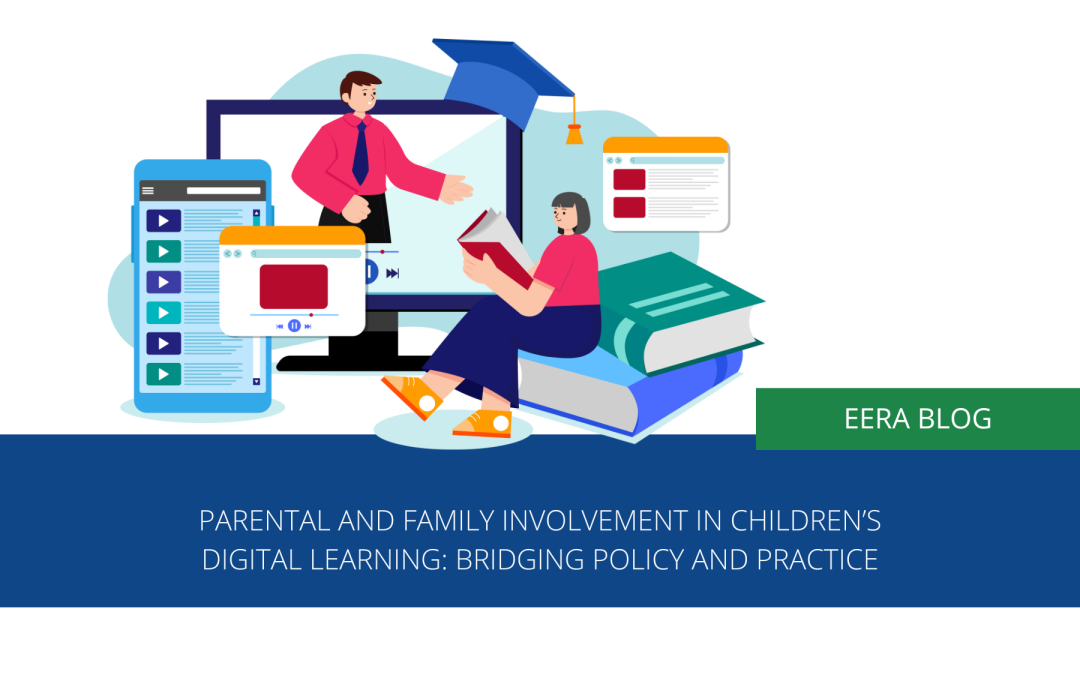
Parental and Family Involvement in Children’s Digital Learning: Bridging Policy and Practice
As education systems adapt to the demands of the digital age, preparing students to live and learn in a technology driven world has become a pressing priority. The successful integration of digital technologies in education is a complex, multi-faceted process that depends on several interrelated factors, including the crucial role of family support and socio-economic conditions (Giannoutsou et al., 2024). This blog briefly explores how European and Irish digital education policies seek to address parental and family involvement in children’s digital learning—a topic we believe deserves greater recognition. We aim to spark discussions about how education systems and school communities can better support families, especially those at risk of digital exclusion. We will conclude with proffering recommendations for bridging gaps in policy and practice to foster inclusive digital learning environments.
Parental involvement in children’s learning: why it matters?
A large body of research highlights the benefits of parental involvement on children’s development, both socially and academically. Whether at home, in school, or both, the more parents actively engage in their child’s education, the better the outcomes. But what exactly is parental involvement in an educational context? Literature describes it as a ‘multi-faceted’ (Epstein, 1995) and ‘multi-dimensional’ concept (Laranjeiro et al.,2023). As a general definition, parental involvement refers to parents actively engaging in their child’s education both at school and at home. Several seminal publications provide frameworks for understanding the concept of parental involvement, including the Parental Involvement Process model (Hoover-Dempsey & Sandler, 1995, 1997) and Epstein’s six types of parental involvement (1995). These frameworks enable us to understand why and how parents become involved in their child’s education.
As education systems and schools work towards integrating digital technologies into education successfully, these theoretical perspectives clearly elucidate the central role parents play. By recognising this role, we can work toward building stronger family-school partnerships in the digital age with the ultimate aim of achieving better outcomes for children.
Policy – the role of parents and families in digital education
The digital transformation of education, defined as “a realignment of education models utilising digital technology to engage students, teachers, parents, and leaders more effectively at every point in the students’ schooling journey” (McCarthy et al., 2023, p. 9), has seen education systems across the globe develop strategies and policies to guide the integration and use of digital technologies in schools (van der Flies, 2020). Yet, parental involvement in digital education is often overlooked in such policies (Internetmatters.org, 2024), despite research highlighting that strong school-parent relationships are integral to the digital transformation process (Giannoutsou et al., 2024).
Some recent development suggests a more optimistic outlook. At EU level, a 2023 European Council recommendation called for the “active participation” of parents and other underrepresented groups in digital education reforms. At national level, Ireland’s Digital Strategy for Schools to 2027 emphasises empowering parents to support children’s digital learning, acknowledging gaps in adult digital skills. Similarly, Ireland’s Literacy, Numeracy, and Digital Literacy Strategy 2024–2033 aims to expand family digital literacy programmes, particularly for marginalised communities.
Enacting these policies and strategies at school level requires the engagement of key actors, particularly school leaders and teachers (McCarthy et al., 2023). By promoting parental involvement in children’s digital learning, they play a key role in fostering stronger family-school partnerships, which work towards enhancing student outcomes (Yulianti et al., 2022). However, with school leaders and teachers already managing numerous policies and initiatives, implementing additional actions to support digital education policies requires substantial investment in both physical and human resources in our educations systems.
What does this look like in practice? Some examples of digital resources and programmes
Building on the understanding of parental involvement as active engagement in children’s education both at home and in school, here are some Irish initiatives and resources designed to support family-school partnerships in the digital age:
- Programme to Enhance Digital Literacy (PEDL): This school-based programme in Ireland is designed to support and shape parents’ digital confidence and competence, enabling them to better support their children’s digital learning. Read more about the programme here.
- European Year of Digital Citizenship Education (2025): Hosted by the Council of Europe, this initiative offers tools and ideas to help parents and carers support their children in becoming ethical individuals who can actively participate in online and offline communities. You can access the resources for parents here.
- Digital Wellbeing Resources: Many available resources for parents focus on supporting aspects of their children’s digital wellbeing, such as internet safety. Two notable examples from Ireland include Webwise Guides for Parents, which addresses issues like cyberbullying and online safety, and Barnardo’s Parent Section, offering practical guidance to foster safe digital environments at home.
These links offer a brief insight into some of the materials available to schools which could be used to foster parental involvement in children’s digital education. For maximum impact, we recommend complementing these resources with training for members of the school community to provide in-person sessions, which facilitate direct engagement and stronger connections between parents and schools. Furthermore, we echo Gonzalez-DeHass et al. (2022) in highlighting the need for further research into meaningful home-based digital learning practices, as well as the development of tailored resources specifically aimed at shaping parents’ competence in using digital learning tools and platforms for education.
Recommendations
To support parental involvement in children’s digital learning, we propose the following actions:
Allocate a Dedicated Parent and Family Support Position in Schools:
Providing dedicated staff to support parents can strengthen family-school relationships. In Ireland, the Home School Community Liaison Officer (HSCLO) role is designed to support parents of students at risk of educational disadvantage. While this position is currently limited to schools with DEIS (disadvantaged) status, its benefits could extend to all schools, fostering greater parental involvement and support across diverse educational contexts. An OECD review (2024) highlighted that even non-DEIS schools see the HSCLO role as a valuable asset. Expanding this position to all schools, with a focus on families at risk of digital exclusion, could significantly enhance parental involvement.
Implement School-Based Interventions to Enhance Parents’ Digital Self-Efficacy:
Low levels of digital self-efficacy hinder parents’ ability and motivation to engage with their children’s digital learning (Gonzalez-DeHass et al., 2022). With adequate training and resources, schools can support the implementation of targeted, in-person interventions to build parents’ digital skills and competences. Such programmes would not only foster stronger family-school relationships but also increase parental involvement in digital learning. To ensure success, school leaders should follow established frameworks, such as those outlined by Qualter (2024). However, for such interventions to be successful, they must be adequately resourced by education systems. This includes providing funding, training, and support for schools to design and deliver these programmes effectively. Without this systemic backing, school leaders and teachers—already stretched by existing demands – will naturally face challenges in implementing these initiatives
Key Messages
- Parental involvement plays a central role in children’s educational outcomes.
- Building meaningful, collaborative family-school partnerships is essential for creating inclusive approaches to digital education and mitigating digital exclusion.
- Parental involvement is increasingly recognised in digital education policies as a key factor in addressing digital exclusion, but more actionable steps are needed to turn this recognition into practice.
- Expanding the Home School Community Liaison Officer (HSCLO) programme, or similar roles, to all schools – regardless of status – can strengthen family-school relationships and provide targeted support for families at risk of many forms of exclusion, including digital.
- School-based interventions designed to enhance parents’ digital self-efficacy can increase their engagement in children’s digital learning and foster more inclusive educational environments.
- Schools must be equipped with adequate human, physical, and digital resources, alongside comprehensive training, to effectively involve families in digital learning and ensure all students benefit from the opportunities of the digital age.
- Successful policy implementation depends on adequate resourcing (see point above). Without this, overburdened school leaders and teachers may struggle to deliver the intended impact of digital transformation initiatives.

Declan Qualter
Practice Placement Supervisor, University College Dublin, School of Education
Declan Qualter works in the School of Education at University College Dublin, Ireland, where he is the Practice Placement Supervisor for the UCD Bachelor of Education with Gaeilge and/or Modern Languages programme, and he also teaches on the UCD Professional Masters in Education programme. In addition, Declan is a PhD candidate at the UCD School of Education, where his research focuses on parental involvement in children’s home-based digital learning. His other research interests are focused on the digital transformation of education, particularly the role of Artificial Intelligence (AI) in educational settings.
Linked in – https://www.linkedin.com/in/declanqualter/
Orcid – https://orcid.org/0009-0005-4872-0343
Research gate – https://www.researchgate.net/profile/Declan-Qualter

Dr Rachel Farrell
Assistant Professor, University College Dublin, School of Education
Dr Rachel Farrell is Assistant Professor of Initial Teacher Education (ITE) and the Director of the Professional Master of Education Programme (PME) in the School of Education at University College Dublin. Rachel’s main research interest is in the area of Democratic Pedagogical Partnerships and Expansive Learning in Initial Teacher Education (ITE). Rachel has led many collaborative initiatives including: effective use of immersive technology in post-primary education with SchooVR, an evaluation of digital portfolios in ITE with MS Education Ireland, cyber resilience education with the Department of the Environment Climate and Communications (DECC) – see www.cyberwise.ie, The Look See What I Can Be: Changing Mindsets/Impacting Futures in STEM funded by SFI and supported by the Professional Development Services for Teachers (PDST), SFI funded Science Week initiative in 2021 and the PDST Young Economist of the Year national awards for post-primary students in association with multiple universities and government agencies.
X – @econrachel
LinkedIn – https://www.linkedin.com/in/rachel-farrell-phd-ucd/
Other blog posts on similar topics:
Epstein, J. L. (1995). School/Family/Community Partnerships: Caring for the Children We Share. The Phi Delta Kappan, 76(9), 701–712. http://www.jstor.org/stable/20405436
Giannoutsou, N., Ioannou, A., Timotheou, S., Miliou, O., Dimitriadis, Y., Cachia, R., Villagrá-, S. S., & Martínez-, M. A. (2024, January 29). Unpacking the impact of digital technologies in Education. JRC Publications Repository. https://doi.org/10.2760/214675
Gonzalez-DeHass, A. R., Willems, P. P., Powers, J. R., & Musgrove, A. T. (2022). Parental involvement in supporting students’ digital learning. Educational Psychologist, 57(4), 281–294. https://doi.org/10.1080/00461520.2022.2129647
Hoover-Dempsey, K. V., & Sandler, H. M. (1995). Parental involvement in children’s education: Why does it make a difference? Teachers College Record, 97(2), 310–331. https://doi.org/10.1177/016146819509700202
Hoover-Dempsey, K. V., & Sandler, H. M. (1997). Why do parents become involved in their children’s education? Review of Educational Research, 67(1), 3–42. https://doi.org/10.2307/1170618
Internetmatters.org (2024, September 6). Children’s Wellbeing in a Digital World — Index Report 2024. Internet Matters. https://www.internetmatters.org/hub/research/childrens-wellbeing-in-a-digital-world-index-report-2024/#full-report
Laranjeiro, D., Antunes, M. J., & Santos, P. (2023). Using Design-Based Research for a Technological Intervention to Promote Parental Involvement in Kindergarten. SN Computer Science, 4(3), 278. https://doi.org/10.1007/s42979-023-01666-8
McCarthy, A. M., Maor, D., McConney, A., & Cavanaugh, C. (2023). Digital transformation in education: Critical components for leaders of system change. Social Sciences & Humanities Open, 8(1), 100479. https://doi.org/10.1016/j.ssaho.2023.100479
OECD. (2024). OECD Review of Resourcing Schools to Address Educational Disadvantage in Ireland. OECD. https://doi.org/10.1787/3433784c-en
Qualter, D. (2024). From Digital Exclusion to Digital Inclusion: Shaping the Role of Parental Involvement in Home-Based Digital Learning – A Narrative Literature Review. Computers in the Schools, 41(2), 120–144. https://doi.org/10.1080/07380569.2024.2322167
van der Flies, R. (2020). Digital strategies in education across OECD countries: Exploring education policies on digital technologies. OECD Education Working Papers, Vol. 226. https://doi.org/10.1787/33dd4c26-en
Yulianti, K., Denessen, E., Droop, M., & Veerman, G.-J. (2022). School efforts to promote parental involvement: The contributions of school leaders and teachers. Educational Studies, 48(1), 98–113. https://doi.org/10.1080/03055698.2020.1740978
